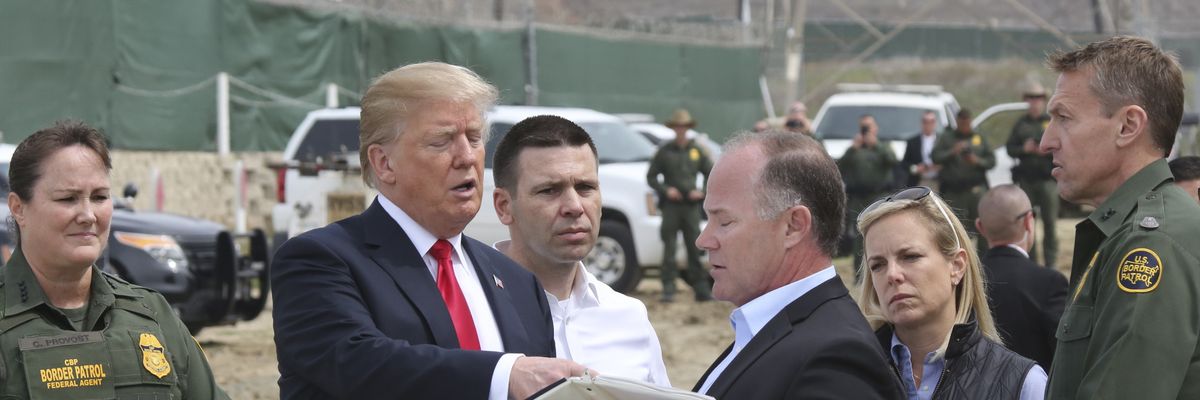A U.S. government watchdog agency on Thursday released a report exposing how former President Donald Trump's wall construction along the nation's border with Mexico negatively affected cultural and natural resources, as critics have long argued.
"The Department of Homeland Security's (DHS) U.S. Customs and Border Protection (CBP) and the Department of Defense (DOD) installed about 458 miles of border barrier panels across the southwest border from January 2017 through January 2021," according to the Government Accountability Office (GAO) report. "Most (81%) of the miles of panels replaced existing barriers."
"The agencies installed over 62% of barrier miles on federal lands, including on those managed by the Department of the Interior," the report continues. "Interior and CBP officials, as well as federally recognized tribes and stakeholders, noted that the barriers led to various impacts, including to cultural resources, water sources, and endangered species, and from erosion."
The GAO document details how the border wall work caused severe erosion; disrupted natural water flows; damaged native plants while spreading invasive species; disturbed wildlife habitats and migration patterns, including for threatened and endangered species; and destroyed Indigenous burial grounds and sacred sites.
"From the start, President Trump's border wall was nothing more than a symbolic message of hate, aimed at vilifying migrants and bolstering extreme MAGA rhetoric," said U.S. House Natural Resources Committee Ranking Member Raúl Grijalva (D-Ariz.), who requested the report in May 2021. "This racist political stunt has been an ineffective waste of billions of American taxpayers' dollars—and now we know it has caused immeasurable, irreparable harm to our environment and cultural heritage as well."
"So much damage has been done, but we still have the opportunity to keep it from getting worse," he stressed. "Environmental restoration and mitigation work must be led by science and input from the right stakeholders, including tribes and communities along the border. So many corners were cut in building the wall—let's not repeat history by cutting corners in repairing the damage it caused."
"The report also makes clear that federal land management agencies, like the Interior Department and U.S. Forest Service, must be involved in environmental restoration and mitigation. These agencies have the utmost expertise and scientific knowledge of the borderlands," he added, calling on Congress to include funds for Interior and the Forest Service in the fiscal year 2024 budget "to make sure they have a strong leadership role going forward."
The GAO's report broadly recommends that the CBP commissioner and Interior secretary jointly document "a strategy to mitigate cultural and natural resource impacts from border barrier construction that defines agency roles and responsibilities for undertaking specific mitigation actions; identifies the costs, associated funding sources, and time frames necessary to implement them; and specifies when agencies are to consult with tribes."
The document adds that "the commissioner of CBP, with input from Interior, DOD, tribes, and stakeholders, should evaluate lessons learned from its prior assessments of potential impacts." The agencies have agreed to implement the recommendations, according to the GAO.
Building the border wall—which also increased rates of serious injuries and deaths among migrants—was a prominent pledge in Trump's 2016 campaign messaging. It was part of a broader anti-migrant platform that continued into his presidency, which also featured the notorious family separation policy.
When Democratic President Joe Biden took office in January 2021, he delivered on a campaign promise to suspend work on the wall. The following month, he ended Trump's related emergency declaration and halted funding toward wall construction. That April, DOD announced that it was canceling all border barrier projects paid for with funds originally intended for other military uses.
While Biden was widely praised for those moves, the GAO report points out that "pausing construction and canceling contracts exacerbated some of the negative impacts because contractors left project sites in an incomplete or unrestored state as of the January 2021 pause, and the sites remained that way, at times, for more than a year."
Biden—who has faced criticism from rights groups for some of his immigration policies—is seeking reelection in 2024. He is expected to face the Republican nominee. Trump is currently the GOP front-runner, despite his various legal problems and arguments that he is constitutionally barred from holding office again after inciting the January 6, 2021 insurrection.
The GAO report was released the same day as a United Nations International Children's Emergency Fund (UNICEF) alert that the number of kids traveling major migration routes in Latin America and the Caribbean hit a new record, due to gang violence, instability, poverty, and the climate emergency. As Common Dreams reported earlier Thursday, CBP has recorded more than 83,000 children entering the United States in the first eight months of this year.




